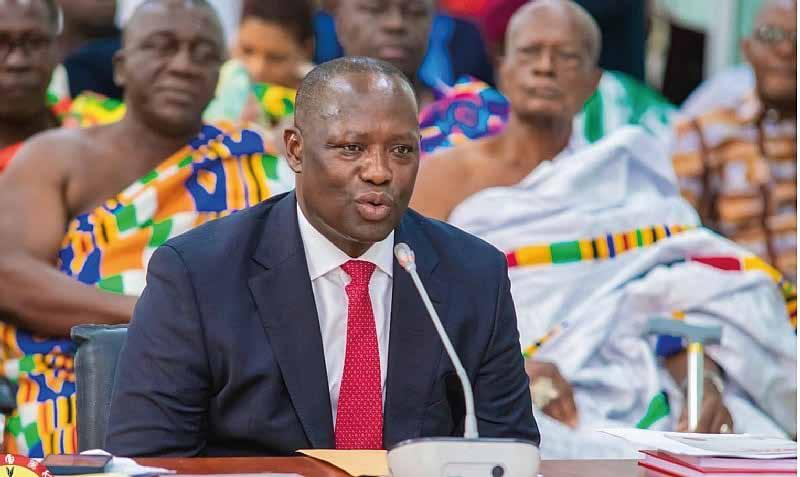
By Eugene Davis

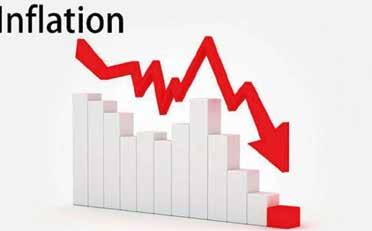


By Eugene Davis


By Eugene Davis




By Eugene Davis

The Minister for Lands and Natural Resources, Hon. Emmanuel Armah-Kofi Buah, has disclosed that the Ministry is preparing a memo with revised proposals to be submitted to Cabinet and, subsequently, to Parliament, in an effort to rescue the Ewoyaa Lithium Project, following recent economic pressures affecting the venture.
The Minister made the disclosure during a parliamentary session, in response to a question from the Member of Parliament for Mfantseman, Dr. Ebenezer
Prince Arhin, under whose jurisdiction the project is located.
“The Ministry has notified Cabinet of the company’s request,” the Minister stated, “and will present a revised memo for Cabinet’s consideration and onward submission to Parliament to ensure the project’s survival.”
Lithium price collapse threatens viability
The Ewoyaa Project, developed by Barari DV Ghana Ltd a subsidiary of Australia-based Atlantic Lithium has come under significant
threat due to a sharp collapse in global lithium prices, which have declined over 80% since their 2022 peak. This downturn has undermined the project’s economic viability.
According to the Minister, the company submitted a formal request to the Minerals Commission, citing unsustainable market conditions. The price of lithium had fallen below US$675 per tonne the estimated cost of production rendering the current terms of Ghana’s new revenue
framework unfeasible.
Barari’s original mining lease, granted in October 2023 for a period of 15 years, was submitted to Parliament in 2024 but was not ratified before the House adjourned for the general elections.
Gov’t considers flexible revenue terms
The Minister revealed that the Ministry has received multiple petitions from local chiefs and community leaders, emphasizing the project’s potential to create jobs, improve livelihoods, and drive infrastructure development.
In response, the Ministry is exploring a scaling mechanism for royalties and other fiscal obligations.
“We are examining whether royalty rates can be adjusted in response to
global price movements,” Hon. Buah said. “For example, if the lithium price returns to US$3,000 per tonne, we could revert to the 10% royalty rate to ensure the project becomes profitable again. The benefit to the country lies not just in royalties, but in jobs, value addition, and long-term economic transformation.”
The revised memo under consideration will reflect these dynamics, and engagements with the company are ongoing.
Ghana’s new mining framework and industry pushback Under Ghana’s new mining revenue regime, lithium producers are required to grant a 10% free carried interest to the state and pay a 13% royalty on gross revenue measures aimed at maximizing state benefits from strategic minerals.
!
Atlantic Lithium is seeking relief from these terms to allow the Ewoyaa Project
to move forward. Several global producers, including those in Australia and Latin America, have halted operations or delayed new projects due to the market slump.
Strategic significance of the Ewoyaa Project
The Ewoyaa Lithium Project is considered one of the most promising new lithium developments in West
Africa. It boasts estimated reserves of 35–40 million metric tons of lithium-bearing ore and is projected to produce 360,000 tons of lithium concentrate annually, primarily for export to the United States.
Industry analysts estimate the project could become a top 10 global producer of spodumene concentrate, positioning Ghana as a new player in
the global EV battery supply chain, currently dominated by Australia, Chile, and China.
However, construction has stalled due to delayed parliamentary ratification and depressed lithium prices, raising concerns about development timelines.
Global outlook and policy implications
Despite recent signs of price sta-
bilization, market analysts remain cautious. Global demand for EVs remains robust, but is being outpaced by new mine supply. Furthermore, geopolitical factors, including U.S. tariffs on Chinese EV components, are complicating global trade flows and investor sentiment.
“Ghana’s objective remains clear,” the Minister emphasized. “We must
add value to our mineral resources, ensure fair returns for the country, and transform local economies. To the extent that this project aligns with that vision, we will support it.”
The Ministry assures Parliament that it will update the House as the revised terms are finalized and the necessary legislative processes are completed.
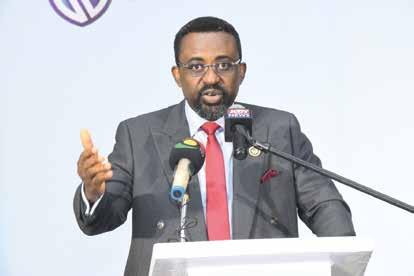
The Bank of Ghana (BoG) has announced that it will hold an emergency Monetary Policy Committee (MPC) meeting today
announced on Friday, July 20, after the meeting.
rently at 13.7 per cent.
According to a notice, the meeting will review developments in the economy over the past two months.
The notice also disclosed that a policy decision of the committee will be
The policy rate currently stands at 28 per cent. There has been a strong push by businesses and industry watchers for the policy rate to be reduced. This is due to the fact that inflation has witnessed a significant reduction over the past months since December last year. Inflation is cur-
Initial engagement with some members of the Monetary Policy Committee has shown some mixed views or reactions. While some are for a policy rate cut, others think the best decision is to still hold on for while looking at current developments on the international market.
The IMF in its latest Staff Report also pushed for some monetary tightening to help bring inflation down to some appreciable levels.
The IMF has again revised its end year inflation target from 12 per cent to 8 per cent. It is not clear whether the Monetary Policy Committee will yield to the current pressure and cut the Policy Rate by a significant margin when it concludes the meeting later this week.
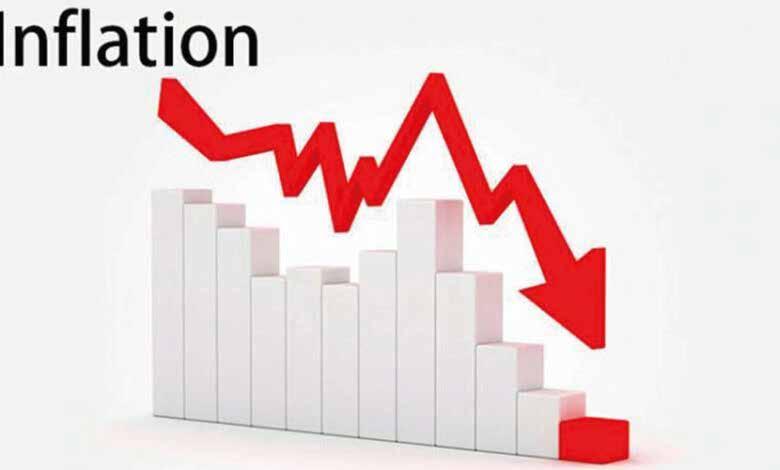
June 2025 was esti mated at 5.9%, the lowest since November 2023. According to data from the Ghana Statistical Service (GSS), this was 4.2 percentage points lower than inflation recorded in May 2025 and 19.7 percentage points lower than inflation recorded a year earlier.
It was also the fifth consecutive decline.
producer price de flation of 1.4%between May and June 2025, meaning that the average prices that producers received for their goods and services in June 2025 were lower than those in May by 1.4%
The Mining and Quarrying, Ghana’s largest sector with a weight of 43.7%, saw inflation plunge by 7.2 percentage points from 13.7% in May to
makes up 35% of the PPI, eased from 9.8% to 7.6%, shedding off 2.2 percentage points. These two sectors alone accounted for the biggest share of the inflation fall.
The data showed that prices are falling in some sectors. Transport costs dropped further from -4.8% in May 2025 to -7.0% June 2025.
The hotel and restaurant prices also swung from
“If these savings reach consumers, we could see real relief on the road, at the table, and when we travel”, the report said.
The Ghana Statistical Service gave advice to businesses, urging them to rethink pricing and renegotiate smartly.
“Falling costs bring opportunity, but tighter margins too. Stay ahead by innovating, not just
It also urged the gov ernment to lock in stability, boost production, and support key sectors like mining and manufacturing with smart incentives to drive demand, protect jobs, and keep the momentum strong. For households and consumers, it urged them to watch prices closely, stating that “Buy smart, question markups, and support brands that pass savings on”.
'
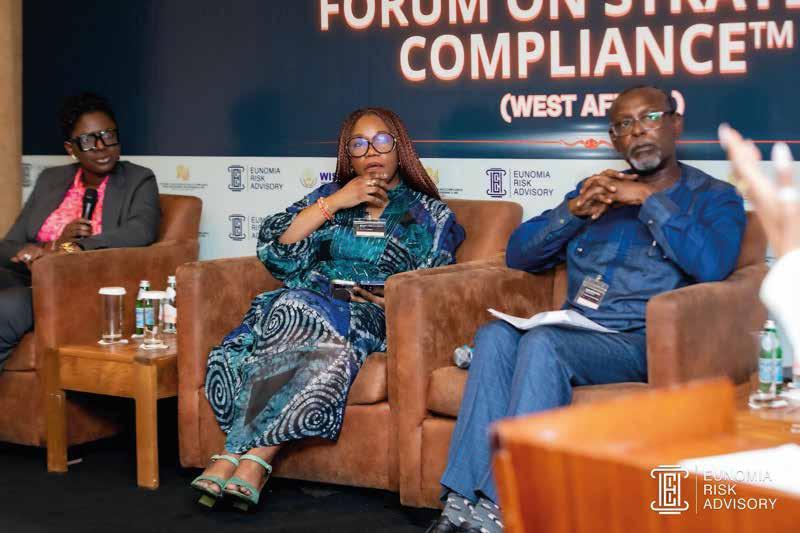
longer wait to be included in the global governance conversation it must now assert its place as a co-architect of governance systems that are ethical, contextually relevant, and future-ready. This was the prevailing message from the inaugural Executive Forum on Strategic Compliance in West
Accra under the leadership of Tiffany A. Archer, Esq., Founder and President of Eunomia Risk Advisory Incorporated. The Forum brought together distinguished leaders across sectors from government and diplomacy to academia, legal practice, and corporate gover-
in candid, high-lev el dialogue on the future of governance, risk management, and compliance across Africa and beyond. The event was convened by Eunomia Risk Advisory and its strategic collaborators, and supported by institutions including the Institute of Directors (IoD), Ghana
Bar Association (GBA), African Corporate Governance Network (ACGN), Public Procurement Authority (PPA), Bank of Ghana (BoG), Ghana Institution of Engineers (GhIE), and State Interests and Governance Authority (SIGA). ‘Africa is Building Its Own Table’ – Tiffany A. Archer, Esq. In her welcome
address, Tiffany A. Archer, Esq., a globally respected governance expert, lecturer at New York University (NYU) and Fordham Law School, and founder of the Executive Forum, set the tone for the day’s discourse. “This is not just a convening, it is a signal that Africa is not waiting to be invited to the table. We are building our own with integrity, intelligence, and intention,” Ms. Archer said. She noted that some of the most courageous and values-driven leadership she has encountered comes from the West African region. “What is needed now is not imported prescriptions, but platforms for African leadership to be seen, heard, and strengthened,” she added. Ms. Archer, whose career spans compli-
ance leadership roles at Fortune 200 companies and global law firms, and advisory work before the U.S. Department of Justice and Securities and Exchange Commission, highlighted that Eunomia’s mission is to help organisations translate commitment into measurable capacity through data-driven, behavioural insights.
Professor Douglas Boateng: “Governance must move from image to impact”
Delivering the keynote address, Professor Douglas Boateng, Chairman of PanAvest International and Africa’s first Professor Extraordinaire for Supply and Value Chain Management, called for a wholesale rethink of Africa’s governance structures.
“Western-style governance models can only take us so far. If we do not reimagine governance, we remain trapped in ceremonial leadership and short-term cycles,” he said. “Ghana led the continent’s political independence. We must now lead its economic emancipa-
tion through Afrocentric governance rooted in our realities,” he further elaborated.
Prof. Boateng’s remarks were grounded in over three decades of experience across boardrooms on five continents. He announced that his newly published governance book written in collaboration with Eunomia has been approved by the National Council for Curriculum and Assessment (NaCCA) for secondary school use in Ghana, and is under consideration in other African nations. The goal, he said, is to build generational governance literacy by “catching them young.”
Governance from the boardroom to the community
The panel sessions featured robust, sometimes provocative exchanges among industry leaders. Professor Marcia Narine Weldon, Director of the Transactional Skills Program at the University of Miami School of Law, Forum Program Faculty Lead, and former Fortune 500 executive, brought a comparative global
perspective to the Forum. “From my work across Latin America, the U.S., and now here in Africa, what stands out is the unique opportunity African leaders have to craft governance models that are not only ethical but also culturally intelligent and community-driven,” Prof. Narine Weldon noted. She stated that the prevailing notion used to be that the U.S. was the world’s compliance policeman. “That is no longer the case. There is space and necessity for African leadership to shape global compliance standards,” she said. Prof. Narine Weldon, who also serves on cross-border governance initiatives and teaches artificial intelligence in compliance, emphasised the role of law and technology in strengthening institutional resilience.
Legal, regulatory and cultural perspectives The legal dimensions of governance reform were explored by NanaAma Botchway, Founder and Managing Partner of n.
dowuona & company, and a respected corporate director. Mrs. Botchway noted the confusion among SMEs regarding governance roles and structures. “We need to simplify the governance framework, especially for small businesses. Most do not even realise they have a board,” she said.
“Our laws are inherited from other jurisdictions and often disconnected from our cultural context. The framework must reflect how we actually work and relate,” she added.
Her comments sparked a spirited debate with GuyChristian Agbor, a legal scholar based in New York and President of the Global Association of Certified Anti-Illicit Financial Flows Professionals. Mr. Agbor introduced his ESGTT framework adding Technology and Taxation to traditional ESG arguing for mandatory enforcement mechanisms to address what he described as “corporate blackmail” from multinationals demanding incentives without accountability.
“Corporations need
us. We are the consumers. We must stop accepting the idea that we need to beg for their presence. Governance must move beyond theory. It must be enforced,” he said.
Ambassador William G.M. Brandful: “Bridge the Disconnect”
Ambassador Dr. William G.M. Brandful, retired diplomat and Ambassador-in-Residence at Wisconsin International University College, highlighted the disconnect between Africa’s development plans and citizen engagement. “Agenda 2063 is a noble framework, but we have not sufficiently involved ordinary Africans in its implementation,” he said, adding that for governance to have impact, it must be understood, internalised, and owned by the people, not just the elite.
He added that despite statistical benchmarks showing Ghana at 46 percent progress toward Agenda 2063 goals, the real measure should be visible improvements in people’s daily lives. Professor Edmund Ato Kwaw: Mobile money and the AfCFTA opportunity
Professor Edmund Ato Kwaw, Associate Professor and Head of Law at Wisconsin International University College, presented a detailed analysis on digital finance and compliance risks. He called for harmonised mobile money regulation across Africa, noting that over 70 percent of the world’s mobile money users are in sub-Saharan Africa.
“Mobile money is
no longer an experiment, it is infrastructure. If we are serious about the African Continental Free Trade Area (AfCFTA), we must ensure our mobile finance systems are not only inclusive but secure and compliant,” Prof. Kwaw explained.
He warned that current gaps in anti-money laundering controls, identity verification, and jurisdictional oversight pose long-term
risks unless addressed through continental cooperation.
A call to action
The Forum concluded with a consensus that governance reform in Africa must be generational, not cyclical. Participants called for stronger boards, ethical leadership, simplified governance for SMEs, and broader public education.
“Compliance is not just about rules it
is about protecting the future. This is not a Ghanaian issue. It is not a West African issue. It is a Pan-African opportunity,” Ms. Archer noted.
About Eunomia Risk Advisory Eunomia Risk Advisory Incorporated is a boutique consultancy dedicated to strengthening governance, ethics, and compliance in emerging markets through
behavioural science, data analytics, and strategic foresight.
Founded by Tiffany A. Archer, Esq., Eunomia supports public and private organisations in reforming culture, mitigating complex risks, and translating values into sustainable impact. The firm is headquartered in New York with a growing presence across Africa, Latin America, Europe and the Middle East.

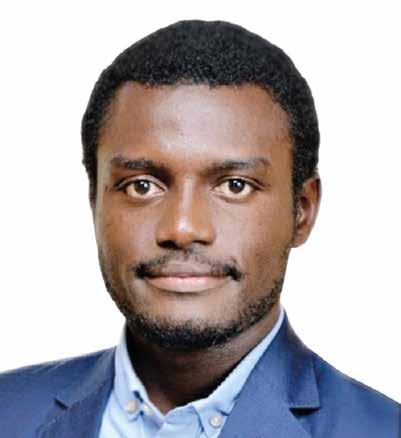
Jumia, Africa’s leading e-commerce platform, has announced the appointment of Seleem Musibau as the new Chief Executive Officer of Jumia Ghana. Seleem brings to the role over a decade of experience within Jumia, with a career that reflects deep expertise in commercial leadership and a strong un-
derstanding of the West African e-commerce landscape. His appointment marks a continued commitment by Jumia to recognize and elevate internal talent, reinforcing a culture of growth and continuity across its markets.
Seleem most recently served as Regional Chief Commercial Offi-
cer, a position he held since February 2024. Prior to that, he played a key role in the success of Jumia Côte d'Ivoire, where he served as Chief Commercial Officer, following several impactful roles within the company. His journey, which began at Jumia in 2014, is a testament to his strong commercial acumen, operational excellence, and leadership depth.
“I am incredibly excited to lead Jumia Ghana at this important moment in our journey. Having worked across multiple markets within Jumia, I’ve seen the incredible potential of e-commerce to transform lives and
businesses. I look forward to working closely with our partners, sellers, and the dedicated Jumia Ghana team to drive growth, strengthen trust, and deliver value to our customers,” said Seleem Musibau, CEO of Jumia Ghana.
“I am confident that his expertise and leadership will be invaluable as we continue to expand and solidify our position in the Ghanaian market. His deep experience in our ecosystem, combined with his strategic vision and passion for results, makes him perfectly positioned to lead Jumia Ghana into its next phase of growth,” Francis Dufay, CEO of Jumia.
About Jumia Jumia is a leading pan-African e-commerce platform, with operations across 9 African countries. Its mission is to improve the quality of everyday life in Africa by leveraging technology to deliver innovative, convenient and affordable online services to customers, while helping businesses grow as they use Jumia's platform to better reach and serve customers.
The Jumia platform consists of a marketplace, which connects approximately 70,000 sellers with customers, a vast logistics network, which enables the shipment and delivery of packages, and a proprietary payment service, JumiaPay, which facilitates transactions among participants active on the Jumia platform in select markets.

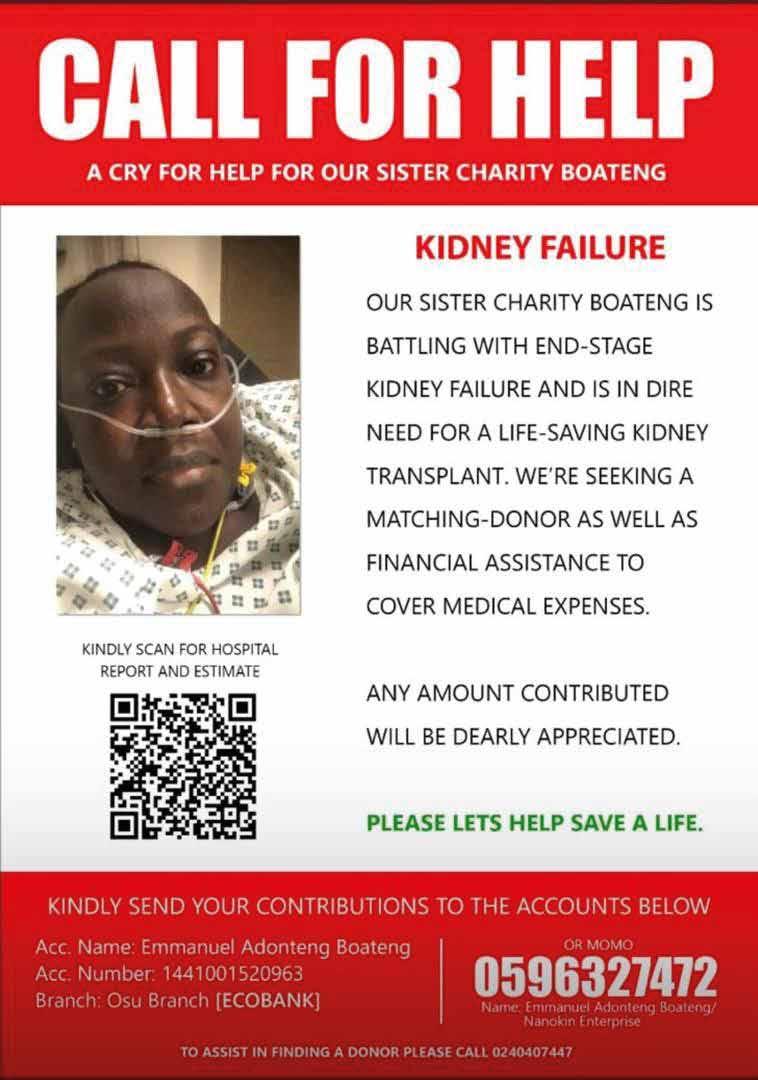
The family of Charity Boateng, a Ghanaian woman suffering from end-stage kidney failure, has made a heartfelt appeal to the public for financial assistance to support her life-saving treatment.
According to her family, Charity is
currently undergoing bi-weekly hemodialysis treatments at Banahene Specialist Hospital in Accra, but urgently requires a kidney transplant to survive. They are seeking both a matching donor and funds to cover the expensive medical procedures.
“Our sister Charity Boateng is battling with end-stage kidney failure and is in dire need of a life-saving transplant,” the family said in a statement.
A medical report signed by Dr. Dexter Nana Bannor Rampson, Resident Medical Officer at Banahene Specialist Hospital, confirms that Charity has been diagnosed with end-stage renal disease (ESRD) and has been receiving dial-
ysis since 2023.
The report estimates the cost of the kidney transplant, to be performed in India, including all medical and logistical expenses for both Charity and the donor, to be between $28,000 and $40,000 USD approximately Ghc 392,000 to Ghc 560,000.
To help meet these costs, the family is urging the public to send contributions to the following Ecobank account:
Account Name: Emmanuel Adonteng Boateng
Account Number: 1441001520963
Charity’s family remains hopeful that with the support of generous donors, she will receive the transplant needed to restore her health.
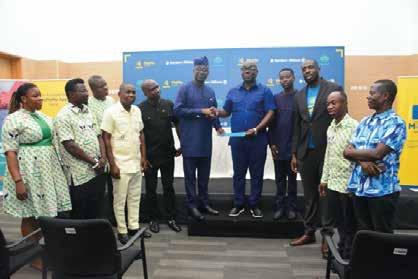
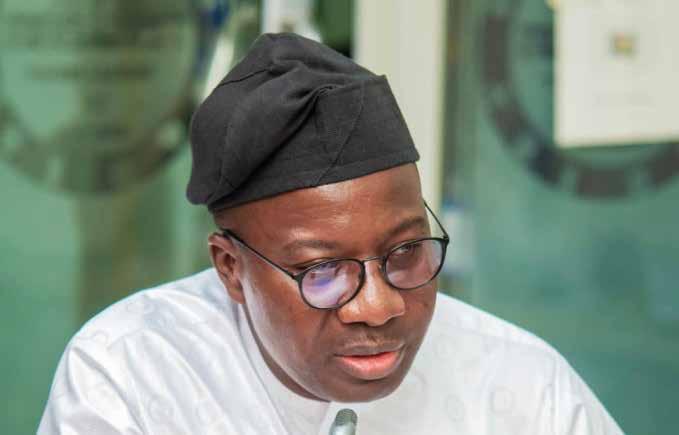
Majority Leader Mahama Ayariga has issued a heartfelt appeal to the Asantehene, Otumfuo Osei Tutu II, urging him to accelerate efforts in facilitating peace talks in Bawku, where rising tensions continue to result in the loss of lives.
The call comes in the wake of a reported military operation in the area, during which at least six people were allegedly killed and over 20 others injured.
Addressing a press conference in Parliament, the Majority Leader emphasized the urgency
of the situation, stating:
“We are appealing to Otumfuo to fast-track his intervention. We acknowledge the complexity of the conflict, but we have full confidence in his leadership and capacity to mediate lasting peace. The
sooner the process is expedited, the better it will be for everyone affected.”
Meanwhile, the Majority Caucus has confirmed the casualties and injuries resulting from the military operation conducted in Bawku on Sunday.
Member of Parlia-
ment for Tempane, Lydia Akanvariba, provided a detailed account of the incident and demanded a formal apology from the military, condemning what she described as acts of unprofessional conduct by security personnel during the operation.

Newmont Ghana Gold Limited (NGGL), a subsidiary of Newmont Mining Corporation, is requesting Expressions of Interest (EOI) from only eligible companies incorporated in Ghana, with proven competencies in the service and maintenance of Atlas Copco Compressors, for its Ahafo South mine operations
This scope includes complete preventive maintenance, corrective work, and major overhauls for Atlas Copco industrial compressors, according to original equipment manufacturer (OEM) speci!cations. The project aims to provide safe and reliable air power systems for workshops by ensuring comprehensive servicing and maintenance, diagnostics , and spares recommendation to keep the equipment running e"ciently.
This scope covers all compressors located within and around the Mine Maintenance workshops, including other accessories that contribute to the proper functioning of the compressed air system. It also involves ensuring Atlas Copco industrial compressors reliably deliver quality compressed air to Mine Maintenance workshops for powering air tools, in#ating tires, and other pneumatic equipment
Goods Included
The goods required include, but are not limited to, the following:
The
Services
The contractor shall perform the following services/work;
! Regularly scheduled visits should be made, and parts changed as per the Atlas Copco (OEM) operations and maintenance manual.
! Four maintenance visits per annum should be carried out on a quarterly basis, and after each visit, the Atlas Copco service engineer shall issue a service report.
! Inspection visits should be scheduled every month.
! Motor greasing will be handled under Atlas Copco’s scope
! Scheduled Preventive Maintenance checks of the motor and screw element will be carried out quarterly, and the SPM values will be mentioned in the service report.
! Breakdown call should be attended to within 24 hours.
! Other consumables will be provided under Atlas Copco's scope/guidance.
! All special tools will be as per Atlas Copco scope/guidance.
Deliverables
To ensure that the selected contractor meets service delivery expectations, the table below sets out minimum deliverables by the contractor. The Newmont key contact person will determine the frequency of submission of these documents.
Minimum Criteria
Interested organizations must demonstrate that they meet the following minimum criteria:
• Demonstrated capability and proven record of successfully providing such services. We require submission of veri!able references to support this capability.


Rabito Clinic is proud to announce the relocation of its Dome branch to a new, more accessible location in Ashongman, adjacent to Melcom. As a trusted name in dermatology and general healthcare for over four decades, this move represents another strategic step in our
mission to bring expert, affordable, and patient-centred care closer to communities. The new Ashongman facility offers improved space, greater convenience, and enhanced accessibility, allowing us to serve our existing clients better while reaching new patients in and around the Ga
East municipality. This relocation strengthens Rabito’s commitment to expanding high-quality healthcare across Ghana. With better infrastructure and increased visibility, the Ashongman branch is poised to improve the overall patient experience through shorter wait times, personalised consultations, and medical technology. The new location also makes accessing our services easier for families, work-
ers, and students in surrounding areas like Taifa, Kwabenya, and Parakuo. As Rabito continues to grow, this relocation symbolises our dedication to staying connected to the evolving needs of our communities. At the new Ashongman branch, patients can enjoy a wide range of services, including:
• Dermatology Consultations
• General Medical Consultations
• Gyneacology
• Laboratory
Services
• Dispensary
• Occupational health
• Clinical Psychology
• Dietetics
• Telemedicine Services
Whether you’re seeking treatment for a chronic skin condition or looking to enhance your skincare routine, Rabito Clinic Ashongman is here to help you thrive. At Rabito, your skin and health come first.

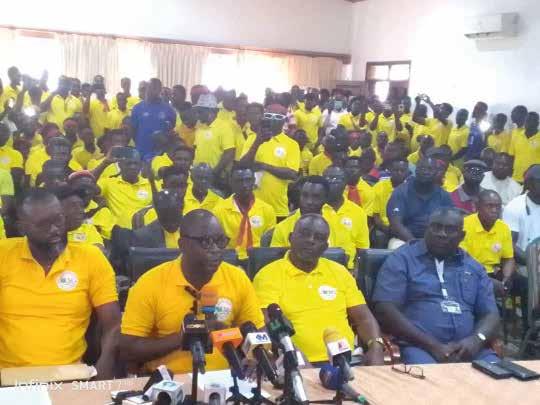
al Association of Small Scale Miners (GNASSM) has sounded the alarm on the alarming rate of harassment, intimidation, and extortion faced by small-scale miners at the hands of some law enforcement agencies and politically exposed individuals.
They have, therefore, demanded immediate release of all excavators
ery seized from licensed small scale miners by the various anti-galamsey taskforce.
At a press conference held in Kumasin on Wednesday, July 16, 2025, the National Communications Director, Abdul-Razak Alhassan, revealed that despite operating within the law, small-scale miners are being targeted and terrorized by those meant to pro-
"We've had enough of these injustices," Alhassan declared. "We demand an end to the extortion, intimidation, and harassment."
According to Alhassan, some police officers and security agencies, often acting under the influence of powerful political figures, storm mining sites, confiscate equipment,
and demand illegal payments.
This, he said, undermines the government's efforts to formalize and expand small-scale mining.
GNASSM is calling for stronger protection for licensed small-scale miners, including clear protocols for police operations on mining sites.
They also proposed an alternative approach – engaging with illegal miners to correct their activities and formalize their operations where possible.
The small-scale mining sector contributes significantly to Ghana's economy, generating $1.7 billion in the first half of 2024 alone. According to the Min-
erals Commission, this accounts for approximately 36% of the country's total gold export revenue.
With the government's initiative to double small-scale gold mining output, the sector is poised to play an even more vital role in the nation's economic growth.
GNASSM is urging the government to support small-scale miners, rather than targeting them.
"We want to work with the government to develop a comprehensive plan to tackle the challenges facing the sector," Armah said. "Together, we can ensure that small-scale mining contributes to the country's economic growth while minimizing its environmental impact."